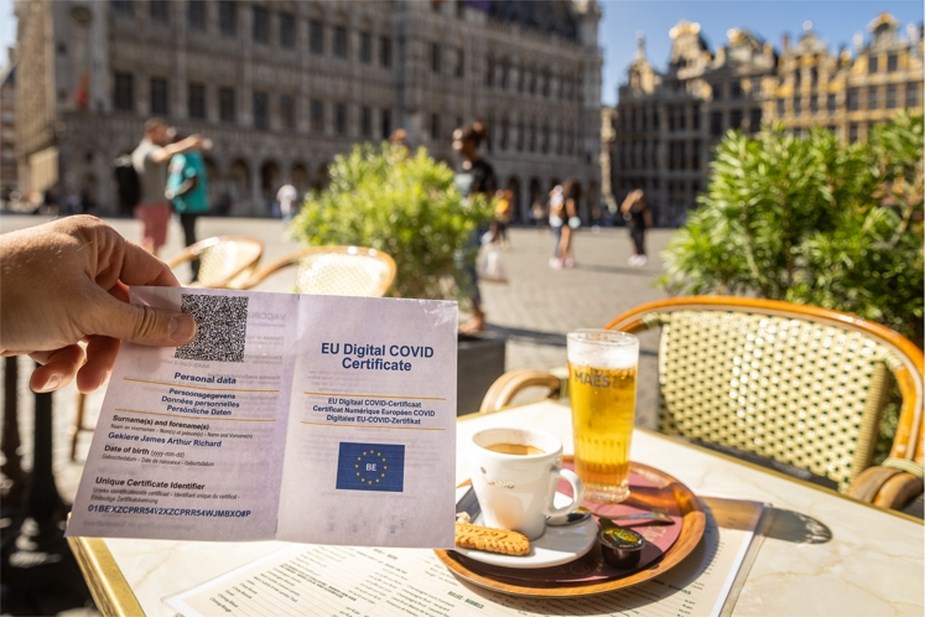As Brussels prepares to expand the use of the Covid Safe Ticket (CST) to bars, restaurants and other businesses, public opinion on its use is split between vaccinated and unvaccinated people and could create tension between the two.
The expansion of the certificate - with which people can prove that they are fully vaccinated, have recently tested negative or recovered from an infection in the past six months and can be used when entering a place where health risks are higher - threatens to become "a double-edged sword," according to the latest Motivation barometer survey.
"Both vaccinated and unvaccinated people have indicated that the expansion of the CST could risk leading to a divide between the two groups in society," the lead researcher of the survey, Professor Maarten Vansteenkiste (UGent), told The Brussels Times.
On Thursday, Belgium’s Consultative Committee validated the cooperation agreement allowing the expansion of the CST, meaning that from 1 October, regions can decide to expand its use to businesses in the hospitality industry, as well as nightclubs and discos, among others, for a longer period.
The latest survey indicates that 92% of unvaccinated people view the CST as a means of pressuring them to get vaccinated, whilst they are asking for patience to make a decision. But the "patience of vaccinated people is fading," the survey results stated.
Focus on health aspect
Vansteenkiste explained that, in general, vaccinated people perceive the CST as a positive measure that shows citizens that some situations are risky and that using it increases safety. But as the results showed, they are in favour of a targeted and selective use in contexts where health safety cannot be guaranteed without using it.
The expansion of the certificate is also seen as a way to motivate people to get vaccinated. However, according to Vansteenkiste it risks doing the complete opposite and will make them think it is closing doors for them, which he warned is a "massive pitfall."
Related News
- Denying freedoms to non-vaccinated people 'certainly' possible, says Belgian Health Minister
- Belgium approves agreement to expand Covid Safe Ticket
- Like Brussels, Vilvoorde also wants to use Covid pass for hospitality industry
"This is why experts have stressed that it is important to draw people's attention to the fact that getting vaccinated is about safeguarding people's health more than it is an instrument to guarantee someone's freedom. Freedom is an added benefit of vaccination, not the goal," he added.
The survey also showed that a focus on safety increases its acceptance among the unvaccinated and elicits less resistance "because it is perceived less as a means of pressure."
Vansteenkiste stressed that by explicitly communicating the effectiveness of vaccination - for example by highlighting the percentage of hospitalised persons who have not been vaccinated - belief in the added value of the vaccine will be strengthened as well as making the unvaccinated aware of the risk.
Regional differences
Brussels is preparing to expand use of the CST, meaning people will likely have to show the certificate to enter bars, restaurants and other "higher risk" establishments in response to the city's increasing infection rates and lower vaccination coverage rate.
But for Marc Van Muylders of Horeca Brussels, putting geographical limitations on the CST use in Belgium is just "moving the problem" to another place.
"People who do not want to be vaccinated or tested can travel ten minutes further for a drink or a meal, then they will be just outside of Brussels, in the Flemish municipalities of Dilbeek, Vilvoorde or Waterloo," he told The Brussels Times.
Vansteenkiste agreed that certain people will see the expansion of the CST as a means of pressure, "meaning there is a real chance that they will look for escape routes. Again, this is why communication regarding its expansion has to focus on the key safety aspect," he said.
Meanwhile, Flanders has also indicated it is considering the CST expansion in certain cities and municipalities, "if the differences in vaccination rates between the municipalities become more pronounced," said Katrien Schryvers, Flemish MP for the Christian democrat CD&V party.
But according to Vansteenkiste and the survey results, whilst Brussels residents appear to be stronger proponents of the CST, those who are vaccinated in Flanders and Wallonia are less keen because the vaccination coverage rate is higher than in Brussels.
"If you do introduce it in this way in other regions, it would have to be connected to some type of alarm threshold system, linked to hospital figures, and not the vaccination rate as it makes clear that the primary purpose of the CST is to ensure the safety and health of people," he said.
Using the CST in this way also emphasises the temporary nature of the measure, as it indicates that once the coronavirus figures improve, the obligation to present a CST can be removed.

